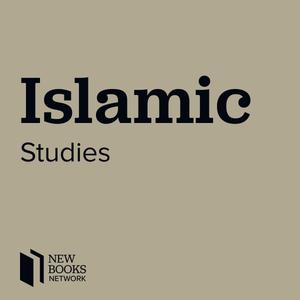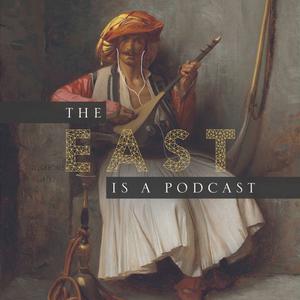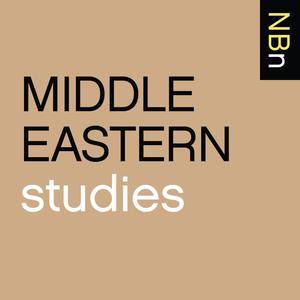
New Books in Islamic Studies
Interviews with Scholars of Islam about their New Books
- 1 hour 5 minutesAmbereen Dadabhoy, "Shakespeare Through Islamic Worlds" (Routledge, 2023)
Shakespeare through Islamic Worlds (Routledge, 2024) investigates the peculiar absence of Islam and Muslims from Shakespeare’s canon. While many of Shakespeare’s plays were set in the Mediterranean, a geography occupied by Muslim empires and cultures, his work eschews direct engagement with the religion and its people. This erasure is striking given the popularity of this topic in the plays of Shakespeare’s contemporaries.
By exploring the limited ways in which Shakespeare uses Islamic and Muslim tropes and topoi, Ambereen Dadabhoy, Associate Professor of Literature at Harvey Mudd College, argues that Islam and Muslim cultures function as an alternate or shadow text in his works, ranging from his staged Mediterranean plays to his histories and comedies. By consigning the diverse cultures of the Islamic regimes that occupied and populated the early modern Mediterranean, Shakespeare constructs a Europe and Mediterranean freed from the presence of non-white, non-European, and non-Christian Others, which belied the reality of the world in which he lived. Focusing on the Muslims at the margins of Shakespeare’s works, Dadabhoy reveals that Islam and its cultures informed the plots, themes, and intellectual investments of Shakespeare’s plays.
In our conversation we discussed Shakespeare’s worldmaking and the social and political worlds of western Europe, the Mediterranean, and the Ottoman empires, famous plays, such as The Tempest, The Merchant of Venice, Twelfth Night, and Othello, the figure of the “Moor,” and the threat of turning “Turk,” the intersection of race and geography in Shakespeare’s works, disrupting Anti-Muslim racism and Islamophobia through critical reading, and Muslim adaptations of Shakespeare.
Learn more about your ad choices. Visit megaphone.fm/adchoices
Support our show by becoming a premium member! https://newbooksnetwork.supportingcast.fm/islamic-studies
17 May 2024, 8:00 am - 1 hour 3 minutesSari Nusseibeh, "Avicenna's Al-Shifā': Oriental Philosophy" (Routledge, 2018)
Sari Nusseibeh's book Avicenna's Al-Shifā': Oriental Philosophy (Routledge, 2018) deals with the philosophy of Ibn Sina - Avicenna as he was known in the Latin West- a Persian Muslim who lived in the eleventh century, considered one of the most important figures in the history of philosophy.
Although much has been written about Avicenna, and especially about his major philosophical work, Al-Shifa, this book presents the rationalist Avicenna in an entirely new light, showing him to have presented a theory where our claims of knowledge about the world are in effect just that, claims, and must therefore be underwritten by our faith in God. His project enlists arguments in psychology as well as in language and logic. In a sense, the ceiling he puts on the reach of reason can be compared with later rationalists in the Western tradition, from Descartes to Kant -though, unlike Descartes, he does not deem it necessary to reconstruct his theory of knowledge via a proof of the existence of God. Indeed, Avicenna's theory presents the concept of God as being necessarily presupposed by our theory of knowledge, and God as the Necessary Being who is presupposed by an existing world where nothing of itself is what it is by an intrinsic nature, and must therefore be as it is due to an external cause. The detailed and original analysis of Avicenna's work here is presented as what he considered to be his own, or 'oriental' philosophy.
Presenting an innovative interpretation of Avicenna's thought, this book will appeal to scholars working on classical Islamic philosophy, kalām and the History of Logic.
Learn more about your ad choices. Visit megaphone.fm/adchoices
Support our show by becoming a premium member! https://newbooksnetwork.supportingcast.fm/islamic-studies
16 May 2024, 8:00 am - 1 hour 6 minutesSalar Mameni, "Terracene: A Crude Aesthetics" (Duke UP, 2023)
In Terracene: A Crude Aesthetics (Duke UP, 2023), Salar Mameni historicizes the popularization of the scientific notion of the Anthropocene alongside the emergence of the global war on terror. Mameni theorizes the Terracene as an epoch marked by a convergence of racialized militarism and environmental destruction. Both the Anthropocene and the war on terror centered the antagonist figures of the Anthropos and the terrorist as responsible for epochal changes in the new geological and geopolitical world orders. In response, Mameni shows how the Terracene requires radically new engagements with terra (the earth), whose intelligence resides in matters such as oil and phenomena like earthquakes and fires. Drawing on the work of artists whose practices interrogate histories of settler-colonial and imperial interests in land and resources in Iran, Iraq, Yemen, Kuwait, Syria, Palestine, and other regions most affected by the war on terror, Mameni offers speculative paths into the aesthetics of the Terracene.
Salar Mameni is an art historian specializing in contemporary transnational art and visual culture in the Arab/Muslim world with an interdisciplinary research on racial discourse, transnational gender politics, militarism, oil cultures and extractive economies in West Asia. Mameni has published articles in Signs, Women & Performance, Al-Raida Journal, Fuse Magazine, Fillip Review and Canadian Art Journal, and has written for exhibition catalogues in Dubai, Sharjah and Istanbul. Mameni was the curator of “Snail Fever,” at the Third Line Gallery in Dubai that explored art as a pandemic bringing together artists from the region whose works consider the embodied, viral and contaminating nature of sonic and visual aesthetics.
Najwa Mayer is an interdisciplinary cultural scholar of race, gender, sexuality, and Islam in/and the United States, working at the intersections of politics, aesthetics, and critical theory. She is currently a Society of Fellows Postdoctoral Scholar at Boston University.
Learn more about your ad choices. Visit megaphone.fm/adchoices
Support our show by becoming a premium member! https://newbooksnetwork.supportingcast.fm/islamic-studies
5 May 2024, 8:00 am - 1 hour 7 minutesZahra Ayubi, "Gendered Morality: Classical Islamic Ethics of the Self, Family, and Society" (Columbia UP, 2019)
How are notions of justice and equality constructed in Islamic virtue ethics (akhlaq)? How are Islamic virtue ethics gendered, despite their venture into perennial concerns of how best to live a good and ethical life? These are the questions that Zahra Ayubi, an assistant professor of religion at Dartmouth college, examines in her new book Gendered Morality: Classical Islamic Ethics of the Self, Family, and Society (Columbia University Press, 2019). Using akhlaq literature by al-Ghazali, Davani and Tusi, Ayubi closely studies the ways in which these male Muslim scholars constructed ideas of the self (nafs), particularly in relation to the family and the society. Despite the ethicists’ differing sectarian and theological orientations in Islam, they still concluded that the status of a perfect ethical human was only achievable by a male elite. Meaning that the capacity to utilize rational faculty, which is central to self-refinement, was deemed not accessible to females, slaves, and non-elite males. In unpacking these gendered and hierarchical dynamics around ethics and comportment, Aybui masterfully applies feminist and gender analysis to deconstruct ethical texts. In light of her findings, she calls for a “philosophical turn” that must employ critical gender analysis when reading these texts not only in the context of Islamic philosophy, but broadly in the study of Islam. The book is a must read for scholars and students interested in Islamic philosophy and gender and Islamic studies.
M. Shobhana Xavier is an Assistant Professor of Religion at Queen’s University. Her research areas are on contemporary Sufism in North America and South Asia. She is the author of Sacred Spaces and Transnational Networks in American Sufism(Bloombsury Press, 2018) and a co-author of Contemporary Sufism: Piety, Politics, and Popular Culture (Routledge, 2017). More details about her research and scholarship may be found on here and here. She may be reached at [email protected].
Learn more about your ad choices. Visit megaphone.fm/adchoices
Support our show by becoming a premium member! https://newbooksnetwork.supportingcast.fm/islamic-studies
4 May 2024, 8:00 am - 56 minutes 20 secondsHarry Pettit, "The Labor of Hope:: Meritocracy and Precarity in Egypt" (Stanford UP, 2023)
Capitalism is not only an economic system but also a system of production and allocation of hope. In Egypt, a generation of young men desire fulfilling employment, meaningful relationships, and secure family life, yet find few paths to achieve this.
In The Labor of Hope:: Meritocracy and Precarity in Egypt (Stanford UP, 2023), Harry Pettit follows these educated but underemployed men as they struggle to establish careers and build satisfying lives. In so doing, this book reveals the lived contradiction at the heart of capitalist systems - the expansive dreams they encourage and the precarious lives they produce. Pettit considers the various ways individuals cultivate distraction and hope for future mobility: education, migration, consumption, and prayer. These hope-filled practices are a form of emotional labor for young men, placing responsibility on the individual rather than structural issues in Egypt’s economy. Illuminating this emotional labor, Pettit shows how the capitalist economy continues to capture the attention of the very people harmed by it.
Harry Pettit is Assistant Professor in Economic Geography at Radboud University Nijmegen. His research is on emotional politics and late capitalism. He has published articles on the emotional politics of precarious labour in Cairo in the International Journal of Urban and Regional Research, Environment & Planning D: Society & Space, and Emotion, Space, and Society.
Yadong Li is a PhD student in anthropology at Tulane University. His research interests lie at the intersection of the anthropology of state, the anthropology of time, hope studies, and post-structuralist philosophy. More details about his scholarship and research interests can be found here.
Learn more about your ad choices. Visit megaphone.fm/adchoices
Support our show by becoming a premium member! https://newbooksnetwork.supportingcast.fm/islamic-studies
2 May 2024, 8:00 am - 1 hour 15 minutesTarana Husain Khan et al., "Forgotten Foods: Memories and Recipes from Muslim South Asia" (Pan Macmillan, 2023)
Forgotten Foods: Memories and Recipes from Muslim South Asia (Pan Macmillan India, 2023) is a collection of essays and recipes that highlights the complex and layered food history of Muslim communities across South Asia. The contributors to the volume include historians, literary scholars, plant scientists, writers, chefs, and more. And their range of essays take us from Ladakh in the north to Sri Lanka in the south, as we learn how food has not been fixed but rather has traveled, survived, and transformed with its peoples. The memories of foods captured here, be it biryanis, pulaos, khicheris, prawn curries, dhal, kanhi (or khanji), and halwa, just to name a few, unsettle gender, class, economic, and caste boundaries, and welcome us to plunge into the delicious food practices of diverse Muslim communities be they Indians, Pakistanis, Rampuris, Kashmiris, Mappila, and Tamils.
The collection also critically highlights how food has been weaponized and politicized (as we see with Muslims eating beef in India today) while also being invoked in discourses of authenticity, especially as food practices and memories travel with those who are displaced into the diaspora, such as amongst Kashmiri Muslims. Food here is then used as an incisive analytical tool to complicate histories and contemporary experiences of Muslims in South Asia. This stunning archive of Muslim food memories and its accompanying delicious recipes will be of interest to so many communities of listeners, from academics of Islam in South Asia, food bloggers, foodies on social media, chefs, and more.
Learn more about your ad choices. Visit megaphone.fm/adchoices
Support our show by becoming a premium member! https://newbooksnetwork.supportingcast.fm/islamic-studies
28 April 2024, 8:00 am - 1 hour 8 minutesM. A. R. Habib and Bruce B. Lawrence, "The Qur'an: A Verse Translation" (Liveright, 2024)
In their landmark new translation of the Qur’an, The Qur’an: A Verse Translation (LIveright, 2024), M. A. R. Habib and Bruce B. Lawrence translate the entirety of the Qur’an in a fashion that beautifully and majestically captures the poetic sensibility of the Qur’an for contemporary English speakers and readers. The distinctive feature of this Qur’an translation is its close attentiveness to the literary possibilities opened by the versification of the text and to the oral and aural capacities of the Qur’an, punctuated by its rhythmic qualities. This book also includes a very helpful glossary and appendix, as well as a deeply erudite account of the translation theory and thought process that went into the composition of this Qur’an translation. This powerful, mellifluous, and often dazzling translation is sure to alternatively jolt and energize the reader; it will also work as a great Qur’an translation in courses on various topics concerning Islam and Muslim societies.
SherAli Tareen is Associate Professor of Religious Studies at Franklin and Marshall College. His research focuses on Muslim intellectual traditions and debates in early modern and modern South Asia. His book Defending Muhammad in Modernity (University of Notre Dame Press, 2020) received the American Institute of Pakistan Studies 2020 Book Prize and was selected as a finalist for the 2021 American Academy of Religion Book Award. His second book is called Perilous Intimacies: Debating Hindu-Muslim Friendship after Empire (Columbia University Press, 2023). His other academic publications are available here. He can be reached at [email protected]. Listener feedback is most welcome.
Learn more about your ad choices. Visit megaphone.fm/adchoices
Support our show by becoming a premium member! https://newbooksnetwork.supportingcast.fm/islamic-studies
23 April 2024, 8:00 am - 1 hour 3 minutesVladimir Hamed-Troyansky, "Empire of Refugees: North Caucasian Muslims and the Late Ottoman State" (Stanford UP, 2024)
Between the 1850s and World War I, about one million North Caucasian Muslims sought refuge in the Ottoman Empire. This resettlement of Muslim refugees from Russia changed the Ottoman state. Circassians, Chechens, Dagestanis, and others established hundreds of refugee villages throughout the Ottoman Balkans, Anatolia, and the Levant. Most villages still exist today, including what is now the city of Amman. Muslim refugee resettlement reinvigorated regional economies, but also intensified competition over land and, at times, precipitated sectarian tensions, setting in motion fundamental shifts in the borderlands of the Russian and Ottoman empires. Vladimir Hamed-Troyansky's Empire of Refugees: North Caucasian Muslims and the Late Ottoman State (Stanford University Press, 2024) tell this story.
The book reframes late Ottoman history through mass displacement and reveals the origins of refugee resettlement in the modern Middle East. Vladimir Hamed-Troyansky offers a historiographical corrective: the nineteenth-century Ottoman Empire created a refugee regime, predating refugee systems set up by the League of Nations and the United Nations. Grounded in archival research in over twenty public and private archives across ten countries, this book contests the boundaries typically assumed between forced and voluntary migration, and refugees and immigrants, rewriting the history of Muslim migration in the nineteenth and early twentieth centuries.
Learn more about your ad choices. Visit megaphone.fm/adchoices
Support our show by becoming a premium member! https://newbooksnetwork.supportingcast.fm/islamic-studies
23 April 2024, 8:00 am - 1 hour 21 minutesArsalan Khan, "The Promise of Piety: Islam and the Politics of Moral Order in Pakistan" (Cornell UP, 2024)
The Promise of Piety: Islam and the Politics of Moral Order in Pakistan (Cornell University Press, 2024) by Arsalan Khan is an incisive ethnographic study of Pakistan’s Tablighi movement. This piety movement attracts Pakistani Muslim men across class, caste, and social contexts and as such Khan is particularly attuned and reflexive as he navigates the boundaries of this community.
Khan theorizes the various modalities of relationality that mark this movement from its sonic and ritual dimensions, especially as it relates to dawat or preaching, to its kinship and ethical ones. Dawat is an analytical tool to map some of the ways in which piety and morality are cultivated in public, private, and domestic spheres by the men of the Tablighi movement. In the end, Tablighi’s ethical worldviews unsettle liberal sensibilities and approaches to Islam (religion) and secularism (non-religion), modernity, sovereignty and much more. This book will be of interest to those think about South Asia, piety movements, anthropology of Islam, Islamic reformism, secularism, and politics and much more.
Learn more about your ad choices. Visit megaphone.fm/adchoices
Support our show by becoming a premium member! https://newbooksnetwork.supportingcast.fm/islamic-studies
19 April 2024, 8:00 am - 50 minutes 47 secondsEgor Lazarev, "State-Building as Lawfare: Custom, Sharia, and State Law in Postwar Chechnya" (Cambridge UP, 2023)
State-Building as Lawfare: Custom, Sharia, and State Law in Postwar Chechnya (Cambridge University Press, 2023) by Dr. Egor Lazarev explores the use of state and non-state legal systems by both politicians and ordinary people in postwar Chechnya. The book addresses two interrelated puzzles: why do local rulers tolerate and even promote non-state legal systems at the expense of state law, and why do some members of repressed ethnic minorities choose to resolve their everyday disputes using state legal systems instead of non-state alternatives?
The book documents how the rulers of Chechnya promote and reinvent customary law and Sharia in order to borrow legitimacy from tradition and religion, increase autonomy from the metropole, and accommodate communal authorities and former rebels. At the same time, the book shows how prolonged armed conflict disrupted the traditional social hierarchies and pushed some Chechen women to use state law, spurring state formation from below.
This interview was conducted by Dr. Miranda Melcher whose forthcoming book focuses on post-conflict military integration, understanding treaty negotiation and implementation in civil war contexts, with qualitative analysis of the Angolan and Mozambican civil wars.
Learn more about your ad choices. Visit megaphone.fm/adchoices
Support our show by becoming a premium member! https://newbooksnetwork.supportingcast.fm/islamic-studies
13 April 2024, 8:00 am - 40 minutes 20 secondsEric Calderwood, "On Earth Or in Poems: The Many Lives of Al-Andalus" (Harvard UP, 2023)
During the Middle Ages, the Iberian Peninsula was home not to Spain and Portugal but rather to al-Andalus. Ruled by a succession of Islamic dynasties, al-Andalus came to be a shorthand for a legendary place where people from the Middle East, North Africa, and Europe; Jews, Christians, and Muslims lived together in peace. That reputation is not entirely deserved, yet, as On Earth Or in Poems: The Many Lives of Al-Andalus (Harvard UP, 2023) shows, it has had an enduring hold on the imagination, especially for Arab and Muslim artists and thinkers in Europe, the Middle East, and North Africa.
From the vast and complex story behind the name al-Andalus, Syrians and North Africans draw their own connections to history’s ruling dynasties. Palestinians can imagine themselves as “Moriscos,” descended from Spanish Muslims forced to hide their identities. A Palestinian flamenco musician in Chicago, no less than a Saudi women’s rights activist, can take inspiration from al-Andalus. These diverse relationships to the same past may be imagined, but the present-day communities and future visions those relationships foster are real.
Where do these notions of al-Andalus come from? How do they translate into aspiration and action? Eric Calderwood traces the role of al-Andalus in music and in debates about Arab and Berber identities, Arab and Muslim feminisms, the politics of Palestine and Israel, and immigration and multiculturalism in Europe. The Palestinian poet Mahmud Darwish once asked, “Was al-Andalus / Here or there? On earth … or in poems?” The artists and activists showcased in this book answer: it was there, it is here, and it will be.
Eric Calderwood is Associate Professor of Comparative and World Literature at the University of Illinois Urbana-Champaign and the author of the award-winning Colonial al-Andalus. He is a contributor to NPR, the BBC, and Foreign Policy.
Tugrul Mende holds an M.A in Arabic Studies. He is based in Berlin as a project coordinator and independent researcher
Learn more about your ad choices. Visit megaphone.fm/adchoices
Support our show by becoming a premium member! https://newbooksnetwork.supportingcast.fm/islamic-studies
8 April 2024, 8:00 am - More Episodes? Get the App
Your feedback is valuable to us. Should you encounter any bugs, glitches, lack of functionality or other problems, please email us on [email protected] or join Moon.FM Telegram Group where you can talk directly to the dev team who are happy to answer any queries.
 The East is a Podcast
The East is a Podcast
 The Thinking Muslim
The Thinking Muslim
 Empire
Empire
 History Extra podcast
History Extra podcast
 New Books in Middle Eastern Studies
New Books in Middle Eastern Studies
 New Books in Critical Theory
New Books in Critical Theory